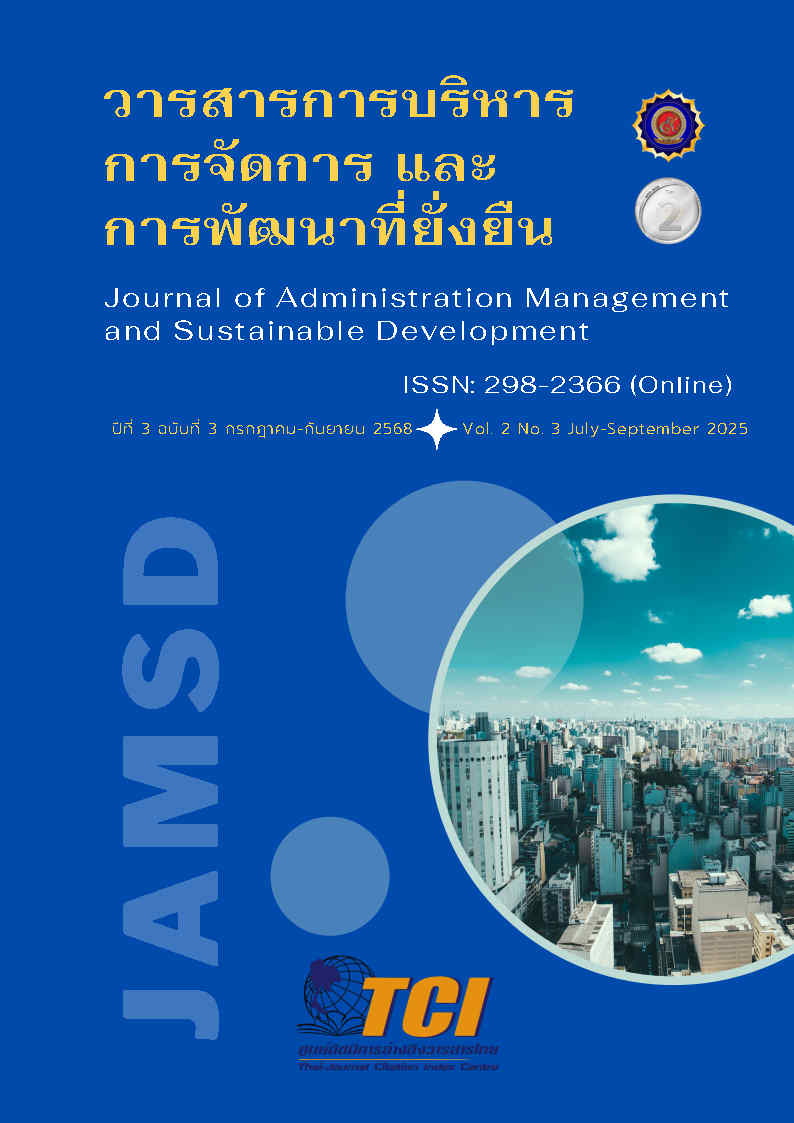ปัจจัยเชิงบูรณาการที่ส่งผลต่อความผาสุกในการเรียนรู้ของนิสิตระดับปริญญาตรี มหาวิทยาลัยมหาจุฬาลงกรณราชวิทยาลัย
คำสำคัญ:
ปัจจัยเชิงบูรณาการ, ความผาสุกในการเรียนรู้, อิทธิบาท 4บทคัดย่อ
การวิจัยนี้มีวัตถุประสงค์ 1. เพื่อศึกษาระดับความผาสุกในการเรียนรู้ของนิสิตระดับปริญญาตรี 2. เพื่อเปรียบเทียบปัจจัยเชิงบูรณาการที่ส่งผลต่อความผาสุกในการเรียนรู้ของนิสิต 3. เพื่อตรวจสอบยืนยันรูปแบบความผาสุกในการเรียนรู้ของนิสิต รูปแบบการวิจัยใช้วิธีแบบผสมผสาน ประกอบด้วย การวิจัยเชิงปริมาณใช้วิธีวิเคราะห์เชิงเปรียบเทียบสาเหตุ กลุ่มตัวอย่าง คือ นิสิตระดับปริญญาตรี จำนวน 337 รูป/คน และการวิจัยเชิงคุณภาพใช้เทคนิคการสัมมนาอิงผู้เชี่ยวชาญ จำนวน 5 รูป/คน ผลการวิจัยพบว่า ระดับความผาสุกในการเรียนรู้ของนิสิตอยู่ในระดับมาก โดยเฉพาะด้านความรักความศรัทธา ส่วนปัจจัยเชิงบูรณาการอยู่ในระดับมาก โดยการฝึกอบรมและความเชี่ยวชาญในสาขาวิชาได้รับความสำคัญสูง การพัฒนาตนเองตามหลักอิทธิบาท 4 โดยเฉพาะฉันทะและวิมังสา เป็นตัวทำนายความผาสุกที่สำคัญที่สุด ร่วมกับความเชี่ยวชาญและการฝึกอบรมเมื่อวิเคราะห์ถดถอยพหุคูณพบตัวทำนายสำคัญของความผาสุกในการเรียนรู้ ได้แก่ อิทธิบาท 4 ด้านความเชี่ยวชาญในสาขาวิชา ด้านการฝึกอบรม ซึ่งสามารถอธิบายการทำนายความผาสุกได้สูงถึง 75.1% นิสิตไทยมีระดับความผาสุกสูงกว่านิสิตต่างชาติอย่างมีนัยสำคัญ โดยเฉพาะด้านศรัทธาและความมั่นคง ขณะที่ผลวิจัยเชิงคุณภาพ พบว่า โมเดล TEXIL-MCU ได้รับการยอมรับจากผู้เชี่ยวชาญว่า เหมาะสมและสามารถนำไปใช้ได้จริง โดยเน้นการบูรณาการหลักอิทธิบาท 4 กับกลไกการศึกษา เช่น การฝึกอบรม การศึกษาดูงาน และการพัฒนาความเชี่ยวชาญ พร้อมข้อเสนอให้พัฒนาเครื่องมือประเมินด้านจิตวิญญาณเพิ่มเติมเพื่อเสริมความครอบคลุมของโมเดล
เอกสารอ้างอิง
กรมสุขภาพจิต. (2564). รายงานประจำปีกรมสุขภาพจิต ปีงบประมาณ 2564. กองยุทธศาสตร์และแผนงาน กระทรวงสาธารณสุข.
พระพรหมคุณาภรณ์ (ป. อ. ปยุตโต). (2562). พุทธธรรม ฉบับปรับขยาย. สืบค้น 17 มิถุนายน 2568 จาก https://www.watnyanaves.net/uploads/File/books/pdf/buddhadhamma_extended_edition.pdf.
พระไพศาล วิสาโล. (2553). สุขภาวะองค์รวม. กรุงเทพฯ: สถาบันวิถีทรรศน์.
มหาวิทยาลัยมหาจุฬาลงกรณราชวิทยาลัย. (2566). แผนพัฒนามหาวิทยาลัย ในช่วงแผนพัฒนาการศึกษาระดับอุดมศึกษา ระยะที่ 13 (พ.ศ. 2566 - 2570). กองแผนงาน สำนักงานอธิการบดี.
มหาวิทยาลัยมหาจุฬาลงกรณราชวิทยาลัย. (2539). พระไตรปิฎกภาษาไทย ฉบับมหาจุฬาลงกรณราชวิทยาลัย. กรุงเทพฯ: โรงพิมพ์มหาจุฬาลงกรณราชวิทยาลัย.
สำนักงานปลัดกระทรวงการอุดมศึกษา วิทยาศาสตร์ วิจัยและนวัตกรรม. (2565). แผนด้านการอุดมศึกษาเพื่อผลิตและพัฒนากำลังคนของประเทศ พ.ศ. 2564 – 2570 ฉบับปรับปรุง พ.ศ. 2566 – 2570. กองยุทธศาสตร์และแผนงาน สำนักงานปลัดกระทรวงการอุดมศึกษา วิทยาศาสตร์ วิจัยและนวัตกรรม.
สำนักงานคณะกรรมการพัฒนาการเศรษฐกิจและสังคมแห่งชาติ. (2562). ยุทธศาสตร์ชาติ พ.ศ. 2561 - 2580 (พิมพ์ครั้งที่ 2). สำนักงานเลขานุการของคณะกรรมการยุทธศาสตร์ชาติ สำนักงานคณะกรรมการพัฒนาการเศรษฐกิจและสังคมแห่งชาติ.
สุมน อมรวิวัฒน์. (2545). ทฤษฎีการเรียนรู้อย่างมีความสุข. กรุงเทพฯ: วัฒนาพานิชสำราญราษฎร์.
Anderson, T., & Shattuck, J. (2012). Design-Based Research: A Decade of Progress in Education. Educational Researcher, 41(1), 16–25.
Best, J. W. (1977). Research in education (3rd ed.). Englewood Cliffs, NJ: Prentice-Hall.
Eisner, E. W. (2017). The Enlightened Eye: Qualitative Inquiry and the Enhancement of Educational Practice. Teachers College Press.
Helliwell, J. F., Layard, R., Sachs, J., De Neve, J.-E., Aknin, L., & Wang, S. (2023). World Happiness Report 2023. Sustainable Development Solutions Network.
Kolb, D. A. (1984). Experiential learning: Experience as the source of learning and development. Englewood Cliffs, NJ: Prentice Hall.
OECD. (2021). The Future of Education and Skills 2030: OECD Learning Compass 2030. Organisation for Economic Co-operation and Development.
Ryff, C. D., & Keyes, C. L. M. (1995). The structure of psychological well-being revisited. Journal of Personality and Social Psychology, 69(4), 719–727.
UNESCO. (2021). Reimagining our futures together: A new social contract for education. United Nations Educational, Scientific and Cultural Organization.
WHO. (2021). Mental health and well-being in schools: A review of the evidence. World Health Organization.
Yamane, T. (1973). Statistics: An Introductory Analysis (3rd ed.). New York: Harper & Row.



